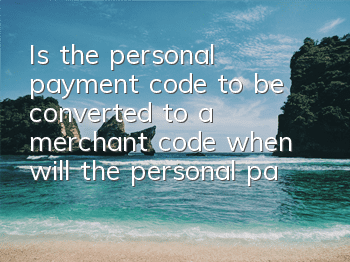Personal collection code will be converted to merchant code? A detailed interpretation is here
On November 26, a news titled "From March 1 next year, WeChat and Alipay payment codes cannot be used for business payments" has attracted widespread attention and heated discussion in the society. Many people believe that WeChat and Alipay payment codes will be banned, further causing fluctuations in the capital market. Stimulated by news such as the accelerated pilot of the digital RMB, the stock prices of third-party payment-related listed companies such as Lakala and New World have soared. Later, media reported that the outside world misreaded this information, and for a while, there were many different opinions and no consensus. So, how should this matter be understood? After the implementation of the new regulations of the central bank, what does it mean for WeChat, Alipay and the third-party payment industry?
Find out the difference between "payment code" and "personal payment code"
The source of the news can be traced back to a "Notice on Strengthening the Management of Payment Acceptance Terminals and Related Businesses" issued by the People's Bank of China on October 13 (hereinafter referred to as the "Notice").
In the "Notice", one mentioned is that "the payment services related to business activities shall not be carried out through personal payment barcodes."
A concept that needs to be distinguished here is that the "personal payment barcode" mentioned in the "Notice" is not the "payment code" we understand in the traditional sense. "Personal payment barcode" mainly refers to the payment codes that come with it on some software such as WeChat, Alipay, and Yipai. It is mostly used for merchants with less revenue in daily transactions. As long as there is a personal payment code, it can meet their daily needs. Just like when we go to the roadside to buy a pancake, we can scan the code to pay.
But the concept of "payment code" is only two words different from the "personal payment code" above, and its meaning may be completely different. In fact, "personal collection codes" are just one of the "collection codes" we call them in daily life. The concept of "payment code" is relatively broad. It also includes business payment codes in addition to individuals.
It should be noted that the "Notice" mentions that "the payment service related to business activities shall not be carried out through personal payment barcodes" is not that "WeChat and Alipay payment codes" cannot be used, but the following points: 1. Restrict personal payment codes to collect remotely; 2. Personal payment codes shall not be used for business payments; 3. A collection barcodes must be classified management systems to distinguish individuals and special merchants, and those with business activities shall be included in the scope of special merchants.
Manager Li of a state-owned bank in our city said that some merchants used "code cards" to collect payments before, and such "personal static payment barcodes" were less secure and were easily exploited by criminals. They needed to apply to the payment service agency (such as WeChat, Alipay, etc.) to convert to a commercial payment code.
Mr. Zhao believes that the "Notice" itself is to solve problems such as gambling and running scores. From personal code to merchant code, there are actually changes in costs. "Begging along the street, performing arts on the street, and selling sweet potatoes cannot meet the characteristics of merchants. It is recommended to raise the standards, such as the daily transaction amount to about 1,500 yuan to about 2,000 yuan. This standard can generally limit gambling and scoring platforms, and protect the rights and interests of most street vendors. The key lies in the determination of this standard."
On the 1st, the reporter visited Wanda Plaza, Wuyue Plaza and other places in Beicheng New District and found that all merchants operate normally using WeChat or Alipay payment codes, which is no different from the past.
Mr. Gao from a shop in Wuyue Plaza said that he had not seen any news about this notice and the collection code of his own store is still in normal use.
For small businesses, the benefits outweigh the disadvantages in the long run
In such a message, netizens are more concerned about what impact this change has on small merchants. Can I still go downstairs to scan the code to buy breakfast?
To this end, many practitioners responded. The reason why such regulations were made is actually to prevent and resolve the risks that may arise during the transaction. Many criminals will use their personal collection codes as a springboard and use high profits to attract people to remotely transfer gambling funds through their personal static collection codes, which is undoubtedly a disruption to market order.
In response to this situation, relevant experts have also made some explanations. Since we chose to make such adjustments, it would be unrealistic for small businesses to have no impact. However, relevant experts said: There will be any impact, but if we look at it from a long-term development perspective, the benefits outweigh the disadvantages.
Essentially, after the policy changes, it has actually reached a higher level from the perspective of rights and interests protection. Because after all, merchant collection codes are a more formal one, and the personal collection codes we usually see can only be said to be a relatively convenient way to transfer money.
In reality, small and micro merchants can still use it normally as long as they convert their collection code into merchant collection codes. Of course, there are certain conditions for applying for a merchant receipt code, such as a series of requirements such as business licenses.
Take Alipay as an example in terms of the process. Merchants who pass Alipay can apply after receiving a QR code certification. If it is a personal account, you can provide a business license as a material. When signing the contract, you also need to provide photos of the business premises, store names, etc.
The reporter called Alipay customer service and learned that the current personal static collection code that can be applied for can realize business collection, and there is no need for a handling fee for withdrawal. The other is the merchant collection code, which requires the merchant to submit a real and valid business license and other information before applying. Specifically in terms of fees, Alipay will charge a 0.6% service fee, and consumers can pay through credit cards, bank cards, Huabei and other methods.
ManyExperts said that judging from the current market situation, whether it is the implementation of the fee reduction policy or the current operating status of small and micro merchants, such changes actually have little impact on small and micro merchants. Even for some small and medium-sized merchants, it adds a guarantee for their financial security. So in the long run, it is beneficial to its development.
The ultimate purpose of the new regulations is to better ensure the security of merchants' funds
Why does the country have this new rule? What is the significance of this move?
First is to improve transaction security. It is mainly targeted at frequent violations such as score running, gambling, and telegram fraud.
The second is to improve the quality of collection services for individual operators and small and micro merchants.
The third is to facilitate national tax management. Since personal payment code collection is not conducive to the state's tax collection, it has strengthened the supervision of large-scale funds for high-income individuals and micro-businesses, and national income is compliant and reasonable tax payments.
According to the reporter, the relevant standards for applying for changes to personal payment codes to business payment codes are still under study, and how to determine whether the personal payment code is used for business payments is a difficult point, because the data is incomplete and it depends entirely on WeChat and Alipay to consciously. This is the difficulty in implementing the notice and a challenge to supervision.
Manager Li believes that even if the policy is implemented in the future, for WeChat and Alipay, it is only necessary to replace and register the merchant’s personal payment code, which will not have much impact on their user scale.
He analyzed that according to the notice, "For physically-specific merchants with fixed business premises, they should be verified by face-to-face on-site; for physically-specific merchants, the acquisition agency should conduct on-site inspections." These regulations mean that if merchants with physically-related business convert their personal codes into merchant codes, WeChat and Alipay must be verified by face-to-face on-site, rather than backend upgrades, they can be directly implemented.
More importantly, if the merchant is managed according to the acquisition of the bill, the merchant needs to access the bill at UnionPay and Network Connect, and UnionPay and Network Connect conduct relevant transactions and funds. The acquiring agency should settle the transaction funds in a timely manner according to the agreement. That is to say, the account collected by the merchant must be a bank account, and cannot be the balance account of WeChat and Alipay that is widely used. It cannot be closed within WeChat and Alipay.
Manager Li said that in fact, the purpose of the central bank issuing the above-mentioned "Notice" is to cut off the "funding chain" of crimes such as cross-border gambling, and thus protect the interests of the public. In recent years, personal payment barcodes have been widely used, effectively meeting the personalized and diversified payment needs of the public and improving the efficiency of funds collection and payment in the small and micro economy and street stall economy. But at the same time, there are some risks and hidden dangers in personal collection barcodes.
People first and protecting the legitimate rights and interests of market entities have always been the starting point for regulatory authorities to formulate policies. In recent years, the public has been using online fraud and onlineIllegal and criminal activities such as online gambling are deeply hated. In the relevant case investigation conducted by the public security organs and financial management departments, it was found that the use of personal payment codes for rent and sale, the transformation of payment acceptance terminals, and the application of fake merchants are common methods used by criminals, which have brought financial losses to many individual merchants. The central bank has issued relevant requirements this time in order to strengthen industry management, plug loopholes, cut off illegal chains, better ensure the safety of individual merchants' funds, and protect the people's "wallets".









